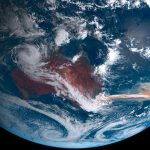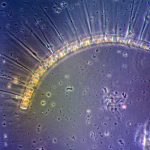 September 16, 2021 8:26 am
Published by Climate Extremes
September 16, 2021 8:26 am
Published by Climate Extremes
The Australian bushfires of the 2019/2020 summer had far-reaching effects. It has now been revealed in new research published in Nature that the smoke produced a phytoplankton bloom larger in area than all of Australia, thousands of kilometres away in the Southern Ocean between New Zealand and South America.
 March 1, 2021 11:57 am
Published by Climate Extremes
March 1, 2021 11:57 am
Published by Climate Extremes
Mi nombre es Denisse Fierro Arcos, soy bióloga marina nacida en Ecuador, pero que adopté a Australia como mi segundo país hace unos años. He trabajado como consultora ambiental e investigadora y he tenido la oportunidad de trabajar en proyectos que se enfocan en una variedad de sistemas y especies marinas en Sudamérica y Australia.
 March 1, 2021 11:53 am
Published by Climate Extremes
March 1, 2021 11:53 am
Published by Climate Extremes
Denisse Fierro Arcos is back in Australia completing her first semester as a PhD student at the University of Tasmania’s Institute for Marine and Antarctic Studies (IMAS). Her project focuses on understanding how fine scale changes in sea ice and ocean conditions affect Southern Ocean marine ecosystems. This is her first blog post.
 July 29, 2020 11:40 am
Published by Climate Extremes
July 29, 2020 11:40 am
Published by Climate Extremes
CLEX researchers and colleagues have highlighted the need for the development of systems to predict marine heatwaves, which are a growing threat to marine ecosystems and industries as the climate changes.
 July 22, 2020 11:02 am
Published by Climate Extremes
July 22, 2020 11:02 am
Published by Climate Extremes
Tiny microbes at the base of the ocean food chain will be increasingly affected by marine heatwaves as the climate changes.
 April 28, 2020 3:06 pm
Published by Climate Extremes
April 28, 2020 3:06 pm
Published by Climate Extremes
New study finds ocean heat asymmetry between hemispheres can be explained by natural variability in the climate system superimposed on long-term ocean warming.
November 4, 2019 2:54 pm
Published by Climate Extremes
Rita Franco-Santos (IMAS). Zooplankton performance in a changing ocean
July 22, 2019 12:15 pm
Published by Climate Extremes
Ever wonder how the oceans coped with ice ages? What sort of changes might have happened? And how can we study these now? Don you Tassie Tuxedo and come down to the Hobart Brewing Company to explore these chilly topics on a chilly July night with Zanna Chase of IMAS.
July 1, 2019 3:27 pm
Published by Climate Extremes
MASS Event: Annalise Rees (Maritime Museum), Mary-Anne Lea (IMAS), Mary Finsterer (Composer), Tom Wright (Librettist). Field reports from the remote, strange, bizarre and beautiful territory of art-science collaboration.
 June 15, 2019 7:16 am
Published by Climate Extremes
June 15, 2019 7:16 am
Published by Climate Extremes
An international team, led by Australian researchers from the ARC Centre of Excellence for Climate Extremes (CLEX) and the Institute for Marine and Antarctic (IMAS) studies, have published in Nature Communications the first global assessment of the major drivers of marine heatwaves.






